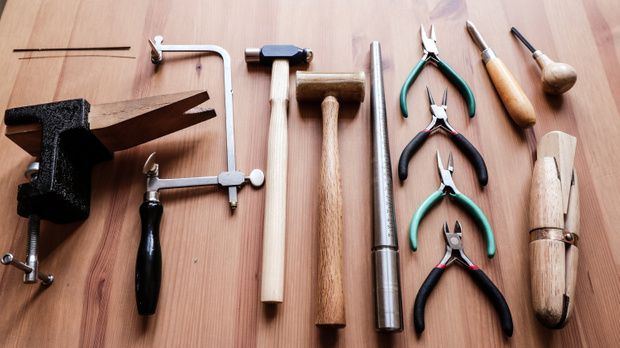Whether you’re taking on home improvement projects, starting DIY crafts, or embarking on your
first professional job, having the right tools is crucial. But with so many options available, how do
you know which ones to start with? This guide will walk you through the essential tools every
beginner needs, all of which can be easily found at your local tool store.
- Hammer
One of the most basic and versatile tools is the hammer. Whether you’re hanging pictures,
assembling furniture, or working on light construction projects, a hammer is a must-have. Opt
for a claw hammer, which features a flat face for driving nails and a curved back to remove
them. Hammers come in different sizes and weights, but a 16-ounce hammer is ideal for most
beginner tasks. - Screwdrivers
No toolkit is complete without screwdrivers. You’ll likely need both flat-head and Phillips-head
varieties, as these cover the majority of screws you’ll encounter in everyday tasks. A
screwdriver set with interchangeable bits is a cost-effective solution, offering versatility without
requiring you to buy separate tools for different types of screws. Most tool stores offer starter
sets that include various sizes for different applications. - Measuring Tape
Accuracy is key in any project, whether you’re building something from scratch or hanging
shelves. A sturdy, retractable measuring tape should be one of the first things you purchase
from your tool store. A 25-foot tape measure is a good standard for most tasks. Look for one
with clear markings and a locking mechanism to make measuring easier. - Utility Knife
A utility knife is essential for cutting a variety of materials, from cardboard to carpet. It’s also
handy for precision tasks like trimming wood or opening boxes. Choose a model with a
retractable blade for safety, and make sure you have extra blades on hand, as they tend to dull
quickly. - Pliers
Pliers are invaluable for gripping, bending, and cutting wires. A standard set of needle-nose
pliers will serve most beginners well, as they allow for precision in tight spaces. Additionally, you
may want to invest in a pair of slip-joint pliers for tasks that require gripping larger objects.
- Adjustable Wrench
When it comes to tightening or loosening nuts and bolts, an adjustable wrench is a go-to tool.
Instead of buying multiple sizes, an adjustable wrench can be modified to fit a range of bolt
sizes. This makes it a cost-effective and space-saving option for your toolkit. - Level
A level is essential for making sure your work is straight and properly aligned. Whether you’re
hanging artwork or installing shelves, a level will help you avoid slanted lines that can make
your work look unprofessional. Most tool stores carry small, portable levels that are perfect for
beginners. - Power Drill
While hand tools are crucial, certain tasks require power tools. A power drill is one of the most
versatile power tools you can own, making it a must-have for beginners. Whether you’re drilling
holes or driving screws, a cordless drill gives you mobility and ease of use. Many tool stores
offer drill kits that come with interchangeable bits and batteries, providing everything you need
to get started. - Toolbox or Tool Bag
Once you’ve collected your essential tools, you’ll need a place to store them. A toolbox or tool
bag keeps everything organized and easy to transport. A sturdy, portable toolbox with
compartments for smaller items like screws and nails is ideal for beginners. Visit your tool store
to find one that suits your needs and budget. - Safety Gear
Finally, remember the safety gear. Safety goggles, gloves, and ear protection are essential to
prevent injury while using hand tools. Most hardware stores sell tool safety kits that come with
everything you need.
Whether you are fiddling and doing home repairs, or starting on a hobby, the very first step to all
beginners is getting yourself solid gear. Used in countless projects, these are the basic sets of
tools that you should be able to get from your local tool store. Once you mature in your practice
and manage the more challenging tasks, it is advisable to equip yourself with some tools that
are far from generic; as for now, here comes a handful of basics.





Be First to Comment